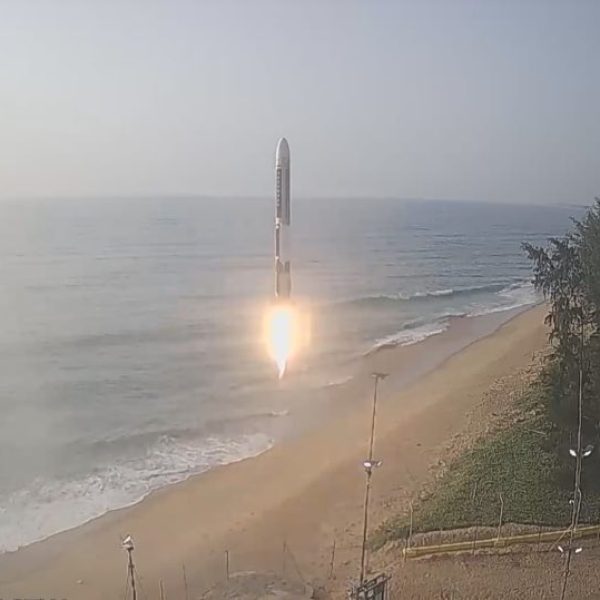
An Uber Rocket To Launch Satellites: Agnikul Magic At IIT Madras

As Aginibaan, the world’s first rocket with 3D printed engine lifted off from Sriharikotta, there was excitement at IIT Madras. The reason, Agnikul the space tech start-up that made this was incubated at the IIT Madras Research Park.
Co-founded by Srinath Ravichandran and Moin SPM, the revolutionary 3D printer makes a rocket engine in 3 days compared to the normal 30 days. With two more printers scheduled to join, they can make eight engines in six days and are planning for a satellite launch every two weeks.
Besides significantly reducing the wait time, it brings down the cost by around 90% for launch of smaller satellites by India and countries around the globe. “There’s going to be a boom in launch of smaller satellites less than 100 kilos, but launch costs now are prohibitive. This will bring about great cost reduction for customers” said Prof Sathyanarayanan R Chakravarthy to tellmystory.in , the Founding Advisor and Faculty in the Aerospace Engineering Department.
Explaining the idea behind, Srinath Ravichandran added “Earlier rocket was like a train. We had to wait for the train to be filled for the launch. Now we have made rocket like a cab. It need not wait”. Moin said “Agnibaan SOrTeD is only the beginning and we are hopeful of contributing to India’s Technological and Economic growth.”
The mission was a sub-orbital technology test flight to demonstrate in house and home grown technologies. It could carry satellites weighing 30 to 300 kilos.
Agnikul aims to democratised access to space. It has over 200 engineers and is guided by 45 former scientists of Indian Space Research Organisation (ISRO)
Its rocket launch accomplishment has come as a feather in the cap for IIT Madras that nurtures deep tech start-ups. “Agnikul exemplifies deepest tech start-up” explained Prof Chakravarthy. Director of IIT Madras, Prof V Kamakoti added “Sky is no more the limit for our start-ups. This is a great inspiration for our student to take up entrepreneurship and become employers”.
Would start-ups like this turn India’s space research organisation ISRO redundant, like the collapsing BSNL in the telecom space ? Professor Chakravarthy says no. He argues “I believe start-ups should be doing routine space activities that are of commercial importance. ISRO should focus on space exploration that would make the country and humanity proud. It should set standards for space technology. Chandrayan, Aditya, Gaganyaan are stellar examples that would plant Indian flag in space tech frontiers “. ISRO Chairman Dr S Somanath said “This motivates ISRO to support space start-ups and non government entities for inmovation to create a vibrant space ecosystem in the country”.
The showpiece start-up that has raised 42 million USD in four rounds is valued at 200 million and showing huge promise to turn into a unicorn.
Check our website www.tellmystory.in
Follow our socials for more inspiring stories —
YouTube: https://youtube.com/channel/
Hoote: https://hoote.page.link/
Instagram: www.instagram.com/tellmystory.
Twitter: www.twitter.com/tellmystory__
Facebook: www.facebook.com/tellmystory.
- Tags: 3D Printed Rocket Engines, Agnibaan, Agnikul, Chennai, IIT Madras, ISRO, Rocket, Satellite Launch, Start-up, Uber

Tell My Story
Related News


My Flu Story

Turning Toward Light

The Beauty of Wishes

At My Parents’ Feet: The Promise I Became

A Gentle Way to Welcome New Year

Who Ysomi Is

An Awakening Without a Name

Recent Stories

A Heart Full of Books

My Flu Story

Turning Toward Light

The Beauty of Wishes

At My Parents’ Feet: The Promise I Became


